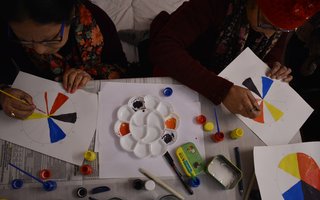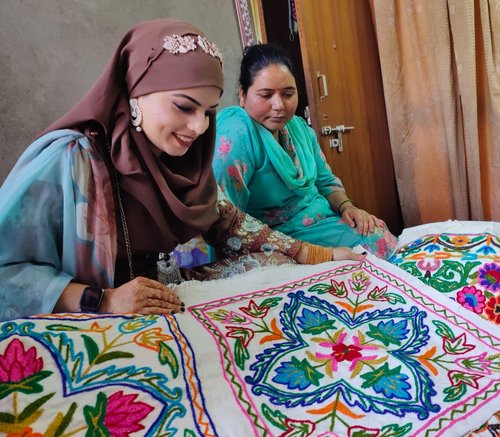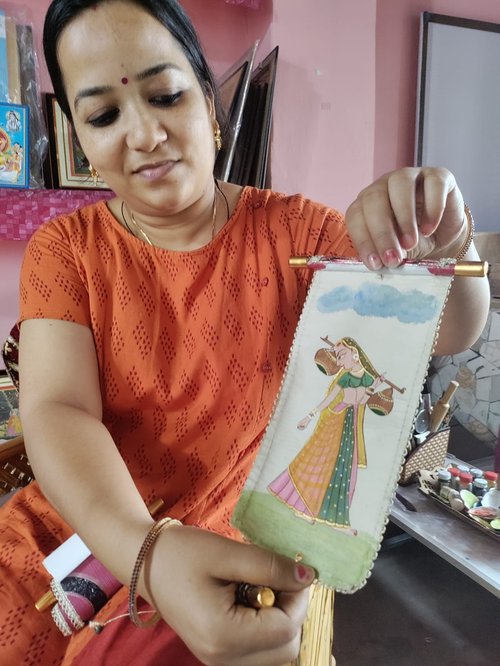From vulnerability to resilience: women artisans in Jammu and Kashmir crafting a new story
Ashima Kaul highlights a peacebuilding project empowering women artisans to take control of their livelihood, and to promote dialogue and resilience between faith communities.

The wood-panelled room on the banks of Dal Lake in Srinagar is abuzz with Kashmiri women artisans sitting around the only heater. They are discussing creative designs, colour combinations, patterns, fabrics and mediums – terminology they have never used before.
“If only this opportunity had come to us 30 years ago, our lives would have been different”, says Basanti, a 60-year-old Kashmiri Pandit living in a refugee settlement on the outskirts of Jammu.
In 1990, Basanti lost her younger brother to the rising insurgency in Kashmir. He was killed by terrorists in his village. Since then, she has lived in exile outside the Valley. Now, she is excited by the prospect of going back ‘home’ as part of a local peacebuilding project.
In December of 2022, with five other women artisans from Jagti, Basanti travelled across the Himalayan Pir Panjal ranges to Srinagar in Kashmir Valley, their homeland.
There, they met a group of Kashmiri Muslim women from downtown, a hub of violent disturbances. “I have never felt joy for a long time. Someone also thought about us,” whispered Fareeda, who lives in downtown and lost her son in 2010 to a ‘brutal death’ in police custody. Stepping out of this environment for collective training with women across the conflict spectrum is a first-time experience: “I want to bring new meaning into my life.”
So do the other five women with her. “I lost my father, sole [breadwinner] in 2004. My mother knew embroidery, so she went to get work to survive. I started to support her to finish orders and get more work done. The training workshop is opening a new chapter in my life”, says Iqra.
Peacebuilding through cultural craft
These women – whether displaced in exile or living amid a live conflict – are all determined to ‘normalise their lives’ and search for dignity and livelihood, despite their losses. For them, the craft is not only their cultural identity but a source of self-worth, connection with their heritage, and healing. “Yeh hamari pehchaan hai” (this is who we are), they say in unison.
This project, bringing together 12 Kashmiri Muslim and Pandit women together for training in traditional Sozni and Aari embroidery and product design, is part of the ‘Culture and Conflict’ initiative by the Gender Justice and Security Hub by the London School of Economics. The initiative focuses on using transformative approaches to address multidimensional and complex development and conflict challenges that have proven resistant to change, prone to fragmented responses, and that cannot be solved by a single organisation or from one disciplinary perspective.
Yakjah Reconciliation and Development Network, a non-profit organisation working for youth and women’s empowerment and sustainable peace, is facilitating the project in Jammu and Kashmir. They have brought together these women from diverse communities to learn about new product designs; marketing; branding; pricing; developing samples; and exploring both national and international markets.
Urzeeba, community mobiliser directly working with the women says, “The hope that they can change their immediate environment around them is stitched to their optimism from the monetary gains they will get from selling their products”, a critical factor in transforming in shifting vulnerabilities to resilience in communities.

Urzeeba, Community mobiliser and field researcher with Yakjah in Kashmir. Credit: Ashima Kaul.
“The ability to bring together people from across fractured ethnic and religious lines, for them to work as a group, collectively ambitious of transforming their own futures, is what Yakjah does extremely well,” says Dr Neelam Raina, Co-Investigator and Project Head from Middlesex University in the United Kingdom.
“I have seen a definite transformation in the women. They have found a voice and are more assertive about their opinions. They are leading the family conversations and also challenging their husbands if they have differing view”, says Akshay Sharma, Yakjah’s Policy and Strategy head.
The project is also opening possibilities of not only rebuilding individual lives of women, but using culture and crafts to create space for peacebuilding dialogue between the two estranged communities of Kashmiri Pandits and Muslims.
“One of the major themes emerging from this project is the larger question of rehabilitation and reformation of communities, especially by looking into how women bear the burden of the conflict, yet remain marginalised in policy”, says Zakir, working on project policy briefs.
Dr Raina adds, “training within the creative industry allows synergies to emerge for women who carry cultural and creative knowledge in an embodied way. These women often pay the steepest price of conflict […] As agents of change, their value to transforming Jammu and Kashmir is key, as individuals their resilience is spectacular.”
Empowered to take control
The enthusiasm is also clear in Dogra women in Jammu who had similar training to develop new products in Basholi miniature painting, a centuries-old Jammu regional art form.
“We want to keep our tradition alive, but also capture new national and international markets, get a better price for our innovative and creativity”, says Antima, a Basholi artist who brought together young women from diverse faiths to train them in the art. Challenging patriarchy, scores of Dogra women are now learning the art to capture the global market.

Antima Manhas, Basholi artisan and master trainer from Jammu. Credit: Ashima Kaul.
Speaking to the women artisans and listening to their stories, it’s evident that women are critical to understanding cultural spaces as sites of identity, refuge, healing, resilience, transformation, and peace.
As Dr Raina stated, “Training in design allows women to own their creativity and make independent informed decisions about their practices of making, allowing them to create products that will be exhibited and sold in London and New York in 2023.”
An advocate for everything handmade, Piyush Suri, Founder and Director of Handmade in Britain, travelled with Dr Raina from the UK to train the women artisans in Jammu and Kashmir. She says, “The women have immense capacity to learn and feel control of their finances. These crafts play an essential role in representing the tradition and culture but also this training is providing them to use those basic skills for making a living”.
This critical factor enables women’s contribution to Jammu and Kashmir’s handicraft sector, which the government is reviving in this economic reconstruction period after years of neglect.
The training will open doors for artisans to step out of the middlemen's clutches and embark on their own: “Earlier, we used to go to the middleman for work. Now we have learned to create our designs and even print them ourselves,” says Bisma, who brought her 3-month-old daughter with her.
She says, “My experience of poverty, living in this strife-torn region is now going to give way to my self-reliance when I will own my own business. In times when young people are leaving this industry for greener pastures, I am going to pass on this craft legacy to my daughter,” who smiles and coos as Bisma picks up the brush to fill a design with colours.








